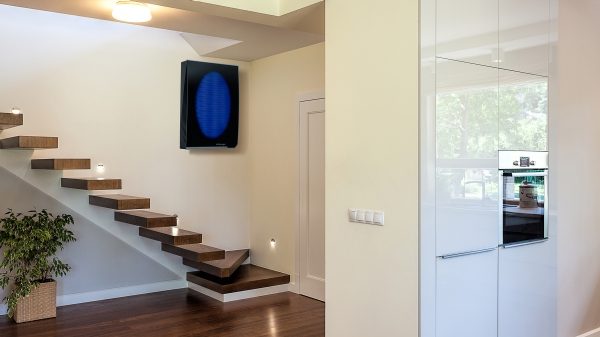
Image: Eaton.
Eaton will place safety, reliability of service and consumer interaction at the heart of its home storage offering as it prepares to roll out nationwide with “an army” of electrical contractors and support staff.
Last week the power technology company launched a new partnership with Manchester City FC to support the roll out of its xStorage Home device, which uses batteries from Nissan to offer a stationary storage solution.
According to Stephanie Ordan, head of Eaton’s energy storage business unit EMEA, the company is aiming to build a “delegated set of certified installers” – two for every postcode – with 100 in place by the end of 2017 to meet expected demand.
They will be trained at a facility in Bedford across a two-day installation programme to ensure that those installing the second life batteries are safe to do so.
Frank Campbell, Eaton’s EMEA president for corporate functions and the electrical sector, said: “This notion that you are going to bring to the market a product and get it into people's homes safely is not trivial. We have 100 years of experience, an army of electrical engineer sales people and support people in this country that can service this product and explain it to customers.
“We support that installer network every single day and call on that distribution channel every single day. That's a very strong differentiator for an electrical manufacturer like us that we go to market and put the product in your home in a safe and efficient way that's cost-effective.”
The safety of installation will be supported by that of the battery technology which according to Eduardo Mascarell, head of vehicle to grid and stationary storage at Nissan Europe, has proven itself to be safe for wider use than in electric vehicles.
“We have more than 300,000 EVs all around the world with zero incidents in the batteries so that reliability and safety in our technology is what gives us the confidence to start analysing new chances to bring new solutions in stationary storage and contribute to this new paradigm of how electricity is being delivered,” he said.
Ordan added: “Between Eaton and Nissan, we are controlling the complete technology and therefore the safety that is around that from the manufacturing up to the delivery and the installation in-house and I think that makes a big difference.”
As well as the “comprehensive training package” undertaken by installers from Eaton and its partner, Carter Sullivan, a third day will be added for those going out to meet homeowners to ensure they can understand the needs of customers and suitability of storage to their homes.
Richard Molloy, head of UK energy storage at Eaton, explained: “There needs to be a conversation between the installer and the homeowner to understand what their expectations are for that system, why they want it, how they are going to use it and to advise them on the best way that they can use it.”
Following a prolonged period of recorded complaints related to mis-selling of energy storage, the chief executive of the Renewable Energy Consumer Code (RECC) Virginia Graham welcomed the emphasis on certification of installers who can explain the product to homeowners.
“I think it's so positive that people coming in to the market understand that you need certified installers, people who understand the technology, the households and what their usage is and how it can work,” she said.
“As well as the technical aspects of the training, we think the consumer protection side of training is very important to understand why people might want this, how it will interact with them and actually understand what it means for somebody in the home.”

